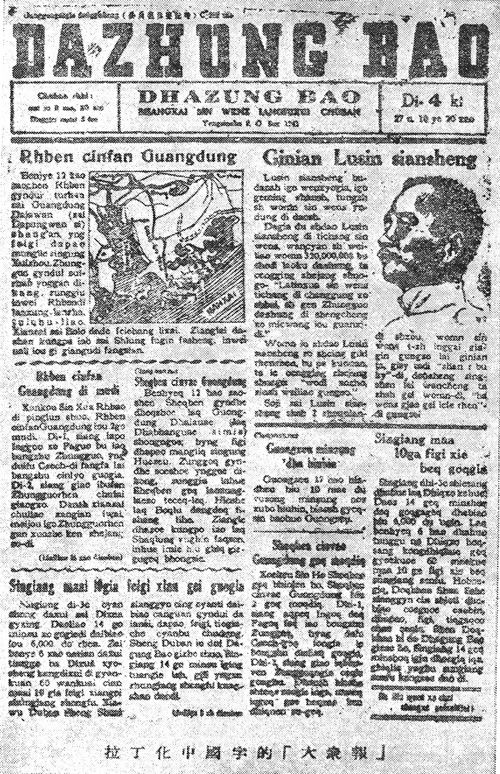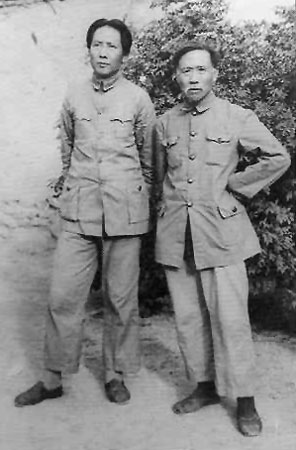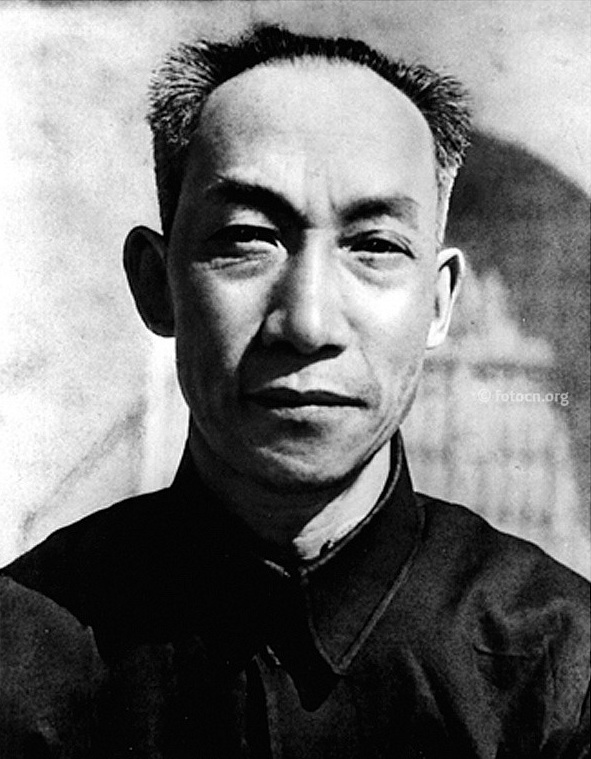|
Latinxua Sin Wenz
Latinxua Sin Wenz (; also known as Sin Wenz "New Script", Zhungguo Latinxua Sin Wenz "China Latinized New Script", Latinxua "Latinization") is a historical set of romanizations for Chinese languages, although references to Sin Wenz usually refer to Beifangxua Latinxua Sin Wenz, which was designed for Mandarin Chinese. Distinctively, Sin Wenz does not indicate tones, under the premise that the proper tones could be understood from context. Latinxua is historically notable as being the first romanization system used in place of Chinese characters by native Chinese speakers. It was originally developed by groups of Chinese and Russian scholars in the Soviet Union and used by Chinese expatriates there until the majority of them left Soviet Union. Later, it was revived for some time in Northern China where it was used in over 300 publications before its usage was ended by the People's Republic of China. History and development The work towards constructing the Beifangxua Latinxua ... [...More Info...] [...Related Items...] OR: [Wikipedia] [Google] [Baidu] |
Romanization
Romanization or romanisation, in linguistics, is the conversion of text from a different writing system to the Roman (Latin) script, or a system for doing so. Methods of romanization include transliteration, for representing written text, and transcription, for representing the spoken word, and combinations of both. Transcription methods can be subdivided into ''phonemic transcription'', which records the phonemes or units of semantic meaning in speech, and more strict ''phonetic transcription'', which records speech sounds with precision. Methods There are many consistent or standardized romanization systems. They can be classified by their characteristics. A particular system’s characteristics may make it better-suited for various, sometimes contradictory applications, including document retrieval, linguistic analysis, easy readability, faithful representation of pronunciation. * Source, or donor language – A system may be tailored to romanize text from a particular lan ... [...More Info...] [...Related Items...] OR: [Wikipedia] [Google] [Baidu] |
Sinologist
Sinology, or Chinese studies, is an academic discipline that focuses on the study of China primarily through Chinese philosophy, language, literature, culture and history and often refers to Western scholarship. Its origin "may be traced to the examination which Chinese scholars made of their own civilization." The field of sinology was historically seen to be equivalent to the application of philology to China and until the 20th century was generally seen as meaning "Chinese philology" (language and literature). Sinology has broadened in modern times to include Chinese history, epigraphy and other subjects. Terminology The terms "sinology" and "sinologist" were coined around 1838 and use "sino-", derived from Late Latin ''Sinae'' from the Greek ''Sinae'', from the Arabic ''Sin'' which in turn may derive from ''Qin'', as in the Qin dynasty. In the context of area studies, the European and the American usages may differ. In Europe, Sinology is usually known as ''Chinese Studies'', ... [...More Info...] [...Related Items...] OR: [Wikipedia] [Google] [Baidu] |
Zhu De
Zhu De (; ; also Chu Teh; 1 December 1886 – 6 July 1976) was a Chinese general, military strategist, politician and revolutionary in the Chinese Communist Party. Born into poverty in 1886 in Sichuan, he was adopted by a wealthy uncle at age nine. His uncle provided him with a superior early education that led to his admission into a military academy. After graduating, he joined a rebel army and became a warlord. It was after this period that he adopted communism. Joining the Chinese Communist Party, he ascended through the ranks of the Chinese Red Army as it closed in on securing the nation in the Chinese Civil War. By the time China was under Mao's control, Zhu was a high-ranking official within the party. He served as commander-in-chief of the Eighth Route Army during the Second Sino-Japanese War and commander-in-chief of the Eighth Route Army during the Chinese Communist Revolution, and the People's Liberation Army after liberation. In 1955, he ranked first among the ... [...More Info...] [...Related Items...] OR: [Wikipedia] [Google] [Baidu] |
Mao Zedong
Mao Zedong pronounced ; also romanised traditionally as Mao Tse-tung. (26 December 1893 – 9 September 1976), also known as Chairman Mao, was a Chinese communist revolutionary who was the founder of the People's Republic of China (PRC), which he led as the chairman of the Chinese Communist Party from the establishment of the PRC in 1949 until his death in 1976. Ideologically a Marxist–Leninist, his theories, military strategies, and political policies are collectively known as Maoism. Mao was the son of a prosperous peasant in Shaoshan, Hunan. He supported Chinese nationalism and had an anti-imperialist outlook early in his life, and was particularly influenced by the events of the Xinhai Revolution of 1911 and May Fourth Movement of 1919. He later adopted Marxism–Leninism while working at Peking University as a librarian and became a founding member of the Chinese Communist Party (CCP), leading the Autumn Harvest Uprising in 1927. During the Chinese Civil War ... [...More Info...] [...Related Items...] OR: [Wikipedia] [Google] [Baidu] |
Shaan-Gan-Ning Border Region
Shaan–Gan–Ning or in postal romanization Shen–Kan–Ning () was a historical proto-state that was formed in 1937 by the Chinese Communist Party following the collapse of the Chinese Soviet Republic in agreement with the Kuomintang as a part of the Second United Front policy, substituting the former anti-Kuomintang Soviets. It existed until 1950. It served as the headquarters base area and was one of the two border region governments with the capital at Yan'an, named after the provinces of Shaanxi, Gansu, and Ningxia with some parts incorporated from Suiyuan province which is now part of Inner Mongolia. Later, the second region that was created was known as the Jin-Cha-Ji Border Area. It is lesser known because the name refers to the old geographic realities, which were Shanxi, Chahar, and Hebei Hebei or , (; alternately Hopeh) is a northern province of China. Hebei is China's sixth most populous province, with over 75 million people. Shijiazhuang is the cap ... [...More Info...] [...Related Items...] OR: [Wikipedia] [Google] [Baidu] |
Lu Xun
Zhou Shuren (25 September 1881 – 19 October 1936), better known by his pen name Lu Xun (or Lu Sun; ; Wade–Giles: Lu Hsün), was a Chinese writer, essayist, poet, and literary critic. He was a leading figure of modern Chinese literature. Writing in vernacular Chinese and classical Chinese, he was a short story writer, editor, translator, literary critic, essayist, poet, and designer. In the 1930s, he became the titular head of the League of Left-Wing Writers in Shanghai during republican era China (1912-1949). Lu Xun was born into a family of landlords and government officials in Shaoxing, Zhejiang; the family's financial resources declined over the course of his youth. Lu aspired to take the imperial examinations, but due to his family's relative poverty he was forced to attend government-funded schools teaching "Western education". Upon graduation, Lu went to medical school in Japan but later dropped out. He became interested in studying literature but was eventually f ... [...More Info...] [...Related Items...] OR: [Wikipedia] [Google] [Baidu] |
Guo Moruo
Guo Moruo (; November 16, 1892 – June 12, 1978), courtesy name Dingtang (), was a Chinese author, poet, historian, archaeologist, and government official. Biography Family history Guo Moruo, originally named Guo Kaizhen, was born on November 10 or 16, in the small town of Shawan, located on the Dadu River some southwest from what was then called the city of Jiading (Lu) (Chia-ting (Lu), ), and now is the central urban area of the prefecture level city of Leshan in Sichuan Province. At the time of Guo's birth, Shawan was a town of some 180 families.David Tod Roy, "Kuo Mo-jo: The Early Years". Harvard University Press, Cambridge, Massachusetts. 1971. No ISBN. Guo's father's ancestors were Hakkas from Ninghua County in Tingzhou fu, near the western border of Fujian. They moved to Sichuan in the second half of the 17th century, after Sichuan had lost much of its population to the rebels/bandits of Zhang Xianzhong ( 1605–1647). According to family legend, the only possessions ... [...More Info...] [...Related Items...] OR: [Wikipedia] [Google] [Baidu] |
Xu Teli
Xu Teli (; February 1, 1877 – November 28, 1968) was a politician of the People's Republic of China. Xu was the teacher of Mao Zedong, Cai Hesen, Xiao Zisheng, and Tian Han. Xu was a member of the 7th Central Committee of the Chinese Communist Party and the 8th Central Committee of the Chinese Communist Party. Biography Xu was born Xu Maoxun () in Changsha County, Changsha, Hunan on February 1, 1877, during the Qing Dynasty. At the age of four, his mother died. In 1885, by age nine, Xu was sent to school. At age eighteen, Xu set up a private school and taught there. In 1905, Xu attended the imperial examination when he was twenty-eight. After graduation, he became a teacher at Changsha Zhounan Girls' School. In 1907, Xu made a report on current affairs in the school, when he talked about the humiliating things of the corrupt government of Qing Empire, large tears began to fill his eyes and broke hot across his cheeks, Xu was indignation that he cut his little finger off ... [...More Info...] [...Related Items...] OR: [Wikipedia] [Google] [Baidu] |
Wang Xiangbao
Wang may refer to: Names * Wang (surname) (王), a common Chinese surname * Wāng (汪), a less common Chinese surname * Titles in Chinese nobility * A title in Korean nobility * A title in Mongolian nobility Places * Wang River in Thailand * Wang Township, Minnesota, a township in the United States * Wang, Bavaria, a town in the district of Freising, Bavaria, Germany * Wang, Austria, a town in the district of Scheibbs in Lower Austria * An abbreviation for the town of Wangaratta, Australia * Wang Theatre, in Boston, Massacheussetts * Charles B. Wang Center, an Asian American center at Stony Brook University Other * Wang (Tibetan Buddhism), a form of empowerment or initiation * Wang tile, in mathematics, are a class of formal systems * ''Wang'' (musical), an 1891 New York musical * Wang Film Productions, Taiwanese-American animation studios * Wang Laboratories, an American computer company founded by Dr. An Wang * WWNG, a radio station (1330 AM) licensed to serve Hav ... [...More Info...] [...Related Items...] OR: [Wikipedia] [Google] [Baidu] |
Xiao San
Xiao San (; 10 October 1896 – 4 February 1983) was a Chinese poet and translator. He was fluent in Russian, French, German, and English. Xiao San was the first writer to write a biography of Mao Zedong. Names His birthname was Xiao Kesen (). His style name was Zizhang (), his given name was Xiao Chunsan (), and he also known as Xiao Zhifan (). His pen name included Emi Siao () and Tianguang (). Biography Xiao was born Xiao Kesen () in Xiangxiang, Hunan, on October 10, 1896, the second son of Xiao Yueying (), a Chinese educator. He had an elder brother, Xiao Zisheng (1894-1976), a Chinese educator and scholar. Xiao San attended Dongshan School and Dongshan High School. He graduated from Hunan First Normal University, where he studied alongside Mao Zedong, Cai Hesen, and his brother Xiao Zisheng. In 1918, he founded New People's Study Society with Mao Zedong, Cai Hesen, and Xiao Zisheng. In 1920, he traveled to France for the Work-Study Program. He joined the Communist Party o ... [...More Info...] [...Related Items...] OR: [Wikipedia] [Google] [Baidu] |
Lin Boqu
Lin Boqu (; Pinyin: ''Lín Bóqú''; Wade-Giles: ''Lin Po-ch'u''; March 20, 1886 – May 29, 1960) was a Chinese politician and poet. An early supporter of Sun Yat-sen and member of the Tongmenghui, as well as a later participant in the Nanchang Uprising and the Long March, Lin came to be seen as one of the elder statesmen of the Chinese Communist Party. On October 1, 1949, Lin presided over the Communist Party's victory ceremony in Tiananmen Square, and stood on the right-hand side of Mao Zedong as he proclaimed the foundation of the People's Republic of China. Biography Lin Boqu, born Lin Zuhan (林祖涵), was raised in a rural family in a village near Changde, Hunan, and received a state grant to study in Tokyo at the age of 16. There, he joined the Tongmenghui, the revolutionary group founded by Sun Yat-sen. After returning to China, Lin worked as a school teacher, before he was recruited to the Dongbei region for revolutionary work on behalf of the Tongmenghui. A ... [...More Info...] [...Related Items...] OR: [Wikipedia] [Google] [Baidu] |
Wu Yuzhang
Wu Yuzhang (; given name Yongshan (); December 30, 1878 – December 12, 1966) was a Chinese politician, educator, and president of Renmin University of China from 1950 to 1966. Biography Wu Yuzhang was born in Rong County, Sichuan in 1878. He joined the Communist Party of China in 1925. In the 1940s, when he was in Yan'an, he and Dong Biwu, Lin Boqu, Xu Teli, Xie Juezai were called as Yan'an Five Seniors (延安五老). (Be A Good Man for the Whole Life), '''' Section 2, June 15, 2005. Legacy [...More Info...] [...Related Items...] OR: [Wikipedia] [Google] [Baidu] |





